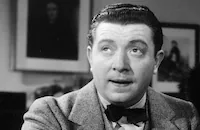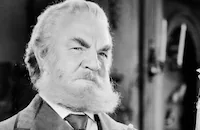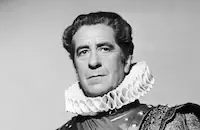The Dark Horse

Brief Synopsis
Cast & Crew
Alfred E. Green
Warren William
Bette Davis
Guy Kibbee
Vivienne Osborne
Frank Mchugh
Film Details
Technical Specs

Synopsis
To break a deadlock at the Progressive party convention, dark horse candidate Zachary Hicks is nominated. Hicks is "so dumb that every time he opens his mouth he subtracts from the sum total of human knowledge," and the party leaders despair of getting him elected governor. Kay Russell, the secretary, suggests that they hire her boyfriend, Hal S. Blake, as campaign manager. They agree, only to find that he is in jail for non-payment of alimony. After they bail him out, Hal sets to work coaching Hicks, advising him to answer all questions, "well, yes, and again, no." When the conservative candidate, Underwood, gives the same Abraham Lincoln speech that Hal has planned for Hicks, Hal jumps up on stage and accuses him of plagiarism. Hicks continues to make public appearances all over the state without ever stating his position on the issues. Hal's ex-wife Maybelle visits campaign headquarters to demand her late alimony payment. Although Joe, Hal's assistant, tells her that Hal is not in the office, Hicks, who finds her attractive, tries to impress her by leading her directly to Hal. Hal somehow manages to come up with her weekly payment, but she is angry about its lateness, so when the opposition campaign manager approaches her with a plan to compromise Hicks, she agrees. On election eve, just after Kay finally agrees to marry him, Hal finds out that Maybelle has taken Hicks across the state line to the country, where they are to be found together playing strip poker. He manages to get Hicks away in time, but when members of the opposition discover Hal and Maybelle together, they threaten to arrest Hal under the Mann Act, and he is forced to remarry Maybelle. Kay is furious until Hal explains that he has accepted a job in Nevada and will get a Reno divorce with no alimony.

Director
Alfred E. Green
Cast

Warren William

Bette Davis

Guy Kibbee

Vivienne Osborne

Frank Mchugh

Sam Hardy
Harry Holman

Charles Sellon
Robert E. O'connor

Berton Churchill

Robert Warwick
Crew

Film Details
Technical Specs

Articles
The Dark Horse
The Dark Horse is a between. It's part comedy-romance, part political satire, carefully timed to open in the summer of a presidential election year. Unlike many of the social dramas of the period, it cheerfully assumes and skates through a climate of boisterous political chicanery. In it, William and Davis spearhead an effort to elect a dim-bulb compromise candidate, Guy Kibbee's upstate apple-knocker named what else? -- Hicks. The film's political orientation is unmistakable. The party we're being asked to root for, however shameless, is the Progressive Party. The enemy is the Conservative Party. It can't have been a casual choice to cast as the Conservative candidate an actor named Berton Churchill, whose looks suggest a cross between Warren Harding and Herbert Hoover, neither Republican president high in the esteem of a Depression-beleaguered America in 1932.
At 73 minutes, it's a prime example of the stuff that rolled off the Warner assembly line snappy, cynical, efficient, topical. The legendary Wilson Mizner, famed for cracking up story conferences with his wit, has screenplay credit here with Joseph Jackson, and Mizner's hand is apparent in the crisp dialogue. That the studio realized it had a good thing in Davis, and was grooming her for bigger things, is evident in the fact that Davis gets a juicy close-up six minutes into the film. She picks it up and runs with it. Already the Bette Davis eyes are in evidence big, hungry, observant, intelligent. We sense the wheels turning in her head a few seconds after we see her as a stenographer on the convention floor. Hearing the political bosses argue, she realizes the time is right to hatch the scheme that brought her there in the first place namely, to sell them on hiring her sweetheart (William), as the promoter who can connive his way to putting their man in the governor's mansion.
William, a sort of down-market John Barrymore with profile to match in frequent close-ups, had shed the patrician roles in which he specialized with his classic features, pencil mustache, tall physique and classy manners for more interesting roles in which he was as well something of a heel. It made him more interesting, resulting in his breakout role earlier that same year in The Mouthpiece in which he played a stylish, fast-talking criminal defense lawyer based on the legendary real thing, William Fallon of Prohibition Era Chicago (most recently resurrected in the hit musical of that name). All glib assurance and slickness personified, he's first seen galvanizing fellow prisoners in the jail to which he's been sent for failure to pay alimony to his grasping ex-wife. When the bosses balk at hiring him after Davis explains he's in jail, she doesn't bat an eye, pointing out that other great men Mark Twain, Oscar Wilde, Columbus were jailbirds, too.
It's that kind of unwavering sass that puts The Dark Horse across. Like so many Warner films of the period, it shakes loose from what could be formulaic shackles because it plays like a convergence of energies, from Zanuck's on down the line. William enjoyed years of success as soon as he connected to roles that spiced his handsome, manly bearing with caddishness, raffishness or roguishness. His range wasn't great, but he could play comedy, as we're reminded in a scene where at a debate, he recognizes the rival candidate's speech as having been filched from Abraham Lincoln because he was about to have Kibbee plagiarize the very same speech. He turns it into an image-boosting triumph by rushing to the stage, identifying the theft and routing the embarrassed rival while avoiding having his own candidate have to embarrass himself.
Making a round of spin-doctoring that remains depressingly resonant today, he and his candidate never look back as Kibbee is packaged and sold as a simple man of the people who'll give the common man a square deal. As "Hicks from the sticks," Kibbee is a distinct plus, smiling fatuously, wearing stupidity like a halo. When he makes a pass at a pretty woman at campaign headquarters, his approach line is "Want an apple?" What he doesn't realize is that the woman is his campaign manager's scheming, spiteful ex (lightly yet pungently played by Vivienne Osborne). With the election in the bag, his enemies plan to snatch it away from him by framing him in a love nest set-up. Can William's wiseguy save the day? Can he stay out of jail?
You can accomplish a lot with Bette Davis on your side. Doffing the cloche hat we first see her in, she's a smart cookie beneath her blond marcelled hairdo. If William is the mouthpiece of the duo, he's as naïve in his way as Kibbee's buffoonish pol. She's the brains of the outfit. Here, her savvy but straight-shooting working girl never does anything impulsively. We're aware that even at this early stage of her career, she's well aware that in film a lot of acting is reacting. In scene after scene, we see her take in new information, shrewdly evaluate it, then figure out the right next move. Those big eyes filled with skepticism convince us utterly that she really cares. She's fully engaged, fully in the moment. At the end, when they fall into the obligatory clinch, the film deflates into one of those you're-a-big-lug-but-I-love-you-anyway-and-I'll-keep-going-with-you moments. You can't help believing that this tough cookie would know better. Whenever they share a scene, William is wood, Davis is fire. Her way of getting her smart-guy boyfriend out of jam after jam is awfully sexy. It, and its surprising political relevance, make The Dark Horse seem still larky today.
Director: Alfred E. Green
Screenplay: Joseph Jackson, Wilson Mizner, based on a story by Darryl F. Zanuck
Cinematography: Sol Polito
Art Direction: Jack Okey
Music: Leo F. Forbstein
Film Editing: George Marks
Cast: Warren William (Hal Samson Blake), Bette Davis (Kay Russell), Guy Kibbee (Zachary Hicks), Vivienne Osborne (Maybelle Blake), Frank McHugh (Joe), Sam Hardy (Mr. Black), Harry Holman (Mr. Jones).
BW-75m.
by Jay Carr
SOURCES:
The Films of Bette Davis, by Gene Ringgold
Mother Goddam, Story of the Career of Bette Davis, by Whitney Stine
Fasten Your Seat Belts: The Passionate Life of Bette Davis, by Lawrence J. Quirk
Don't Say Yes Until I Finish Talking: A Biography of Daryl F. Zanuck, by Mel Gussow
The Warner Brothers, by Michael Freedland
My First Hundred Years in Hollywood, by Jack Warner, with Dean Jennings
IMDb

The Dark Horse
Quotes
He's the dumbest human being I ever saw. Every time he opens his mouth he subtracts from the sum total of human knowledge.- Hal S. Blake
Trivia
Notes
Variety states that the press sheet credited the story to a pseudonymous source "close to Washington politics" and further notes that if so, the name of Melville Crossman (a pseudonym of Warner Bros. executive Darryl F. Zanuck) should be removed from the screen credits. Modern sources credit Sam Bischoff as associate producer.
















